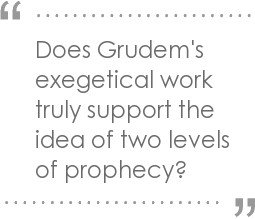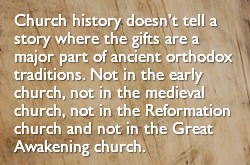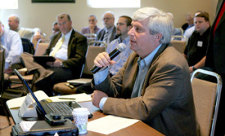Discernment and Revelation, Part 3: The Case for Cessationism
With Parts 1 and 2 as a backdrop, the question is reduced to this: Is God giving authoritative revelation on par with that which He has given in the past (much of which has been inscripturated) or is He not? If He is, then the church of Christ needs to take note and come into compliance with the modern prophecy movement, following its revelations as it would Scripture. But if the Lord is not revealing His inspired word today, then we need to reject the claims of the modern prophets and expose these supposed revelations for what they are.
This means the position taken by most on prophecy—cautious but open—is untenable. The cautious but open crowd is skeptical of the claims coming from the prophetic movement, and they are suspicious of the many “words from God” that so many evangelicals are claiming. Still, they hesitate to embrace cessationism. They are concerned about limiting God or, as it was mentioned earlier, “putting God in a box.” To this let me make two replies:
- It is okay to “put God in a box” if God, in fact, is the One who put Himself in that box. In other words, God can do anything He wants to do, but we expect God to do what He says He will do. If God has put Himself in the cessationist box we can embrace and proclaim it.
- Taking the open but cautious view really does not hold up. Either God is speaking today apart from His Word or He is not. If He is speaking, how do we determine which of the multitude of messages people claim are from Him and which are bogus? If, with Grudem, we have eliminated the tests of Deuteronomy 13 and 18, how are we to evaluate all these revelations? How do we know to whom we should listen and whom we should ignore?
Discussion
'Strangers to Fire' Blasts Back at Cessationist Movement; Defends Use of Supernatural Gifts of the Holy Spirt
Body
“[W]e’re saying that John MacArthur is stranger to the authentic fire of the Holy Spirit and of revival”
Discussion
From the Archives: Are There Two Levels of NT Prophecy?
 (Originally posted in April of 2011)
(Originally posted in April of 2011)
Did all the miraculous gifts of the Spirit, such as tongues and prophecy, cease with the completion of the New Testament? If we take the position that prophecy continues in some form, is such a view compatible with the conviction that God has given us all the authoritative revelation He intended to give (that the canon of Scripture is closed)?
In 2011, Dr. Bruce Compton (Detroit Baptist Theological Seminary) presented a paper on these questions at the Preserving the Truth Conference. What follows is a summary reflecting my understanding of Compton’s analysis. (An updated version of the paper is available here.)1
The two levels of prophecy view
Since Dr. Wayne Grudem’s work has been foundational for many who believe in a continuing gift of prophecy, Compton’s paper focuses on Grudem’s view2 that the NT speaks of two levels of prophecy: apostolic and non-apostolic. Grudem maintains that apostolic prophecy was authoritative and inerrant in the same way that Old Testament prophecy was and that this form of prophecy ceased when the NT Scriptures were completed.
Discussion
Sam Storms: Why I Am a Continuationist
Discussion
Reflections on Strange Fire and the Problem of Continuationism

John MacArthur proved once again why his ministry has endured and has the kind of influence that few men ever attain. Last week the folks at Grace held the Strange Fire conference. Unfortunately I was not able to attend and I heard only bits and pieces of the live stream. I hope to listen to the entire conference as I travel to Romania this week for a graduation next Sunday. Some may think that posting a piece on the conference without having heard much of it is premature. But let me say thank you to John and the men and women who endured the opprobrium of the Charismatics to bring some needed criticism to a movement that has created no small amount of international controversy. Most American Christians are only familiar with the Charismatic movement’s American permutations. As pernicious as some of these are, the international manifestations are far worse. For this reason, the conference was a necessary warning. Let me explain.
In recent years, I have made 18 trips abroad to countries as diverse as Zambia, India, Romania, Russia and the Ukraine. Pentecostalism and the Charismatic movement have reached all of these places, with some very devastating effects. It should be noted that from a historical standpoint, nearly all world Charismaticism is rooted in early American Pentecostal sources that have been exported around the world. Modern international developments may be indigenous, but most of the early ideas came from early 20th century American Christianity.
Discussion
Signs? Prophets? Miracles?
 Reprinted with permission from Baptist Bulletin Sep/Oct 2013. All rights reserved.
Reprinted with permission from Baptist Bulletin Sep/Oct 2013. All rights reserved.
Council on Dispensational Hermeneutics meets
CLARKS SUMMIT, Pa.—“Traditional dispensationalists do not have a place where we can go to talk to each other,” says Mike Stallard as he welcomes the Council on Dispensational Hermeneutics, meeting on the campus of Baptist Bible Seminary, Clarks Summit, Pa.
Stallard, the seminary dean, is explaining why the council was formed in 2008, and why the steering committee has planned two days of talk. Lots of talk.
Thirty theologians sit at the front of the room at long tables, members of the council. Most of them have their laptops open, looking at papers while the author reads them to the group. The wonky presentation style is familiar to anyone who has attended an academic conference, except the schedule leaves plenty of time for questions. Stallard describes it as “more of a discussion group than a presenter group.”
Discussion
"Phonity. noun: superficial unity for which fundamental differences are ignored."
Body
“As long as Reformed—which I assume to be cessationist*—and Charismatic Christians continue to pretend the differences between them are minor and sweep them under the couch, their unity is fake, false, phony, fraudulent, and fraught with failure.” Phonity




Discussion